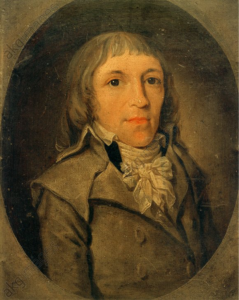Night song
(Poet's title: Nachtgesang)
Set by Schubert:
D 314
[October 19, 1815]
Part of Kosegarten (putative cycle)
Tiefe Feier
Schauert um die Welt,
Braune Schleier
Hüllen Wald und Feld.
Trüb und matt und müde
Nickt jedes Leben ein,
Und namenloser Friede
Umsäuselt alles Sein.
Wacher Kummer,
Verlass ein Weilchen mich!
Goldner Schlummer,
Komm und umflügle mich!
Trockne meine Tränen
Mit deines Schleiers Saum,
Und täusche, Freund, mein Sehnen,
Mit deinem schönsten Traum.
Blaue Ferne,
Hoch über mich erhöht!
Heil’ge Sterne,
In hehrer Majestät!
Sagt mir, ist es stiller,
Ihr Funkelnden, bei euch,
Als in der Eitelkeiten
Aufruhrvollem Reich?
A profound solemnity
Is reverberating around the world,
A brown veil
Is wrapping the forest and the field.
Gloomy and faint and tired
All life is falling asleep,
And a nameless peace
Is murmuring around all that exists.
Sorrow that keeps me awake,
Leave me for a short time,
Golden slumber,
Come and put your wings around me!
Dry my tears
With the hem of your veil,
And deceive my longing, friend,
With your most beautiful dream.
Blue distance,
Raised high above me!
Holy stars,
In noble majesty!
Tell me, is it quieter
Where you are, you sparkling ones,
Than in the vanities
Of this tormented Empire?
All translations into English that appear on this website, unless otherwise stated, are by Malcolm Wren. You are free to use them on condition that you acknowledge Malcolm Wren as the translator and schubertsong.uk as the source. Unless otherwise stated, the comments and essays that appear after the texts and translations are by Malcolm Wren and are © Copyright.
☙
Themes and images in this text:
Blue Brown Covers and covering Dreams Fields and meadows Gold High, low and deep Longing and yearning Near and far Night and the moon Serenades and songs at evening Sleep Songs (general) Stars Tears and crying Veils Wings Woods – large woods and forests (Wald)
There can be no adequate English translation of the word ‘Feierabend’, literally ‘eve of a celebration’, since the nearest people come in English speaking cultures to participating in such an event is ‘going out for a drink’ with colleagues after work on Friday afternoons. Originally it referred to the beginning of the celebration of a major festival as soon as work ended at sunset the previous day, but it soon came to denote the end of work itself. People take stock of the working day that has just ended and take advantage of the pleasures of the evening: relaxation, good company, food and drink.
This is what we expect to be going on when Kosegarten begins his ‘night song’ with a reference to ‘Tiefe Feier’, a profound festivity, which is reverberating around the world. We think that the poem is a standard ‘reflections on evening and the dying day’ text. Yes, there will be sublime intimations of mortality, but there will also be the promise of a new, brighter day tomorrow. The night that is falling is not going to be endless horror. It is all part of the reassuring pattern: darkness falls, we sleep, the sun rises, we wake up, all taken allegorically as meaning that when our life comes to an end our death is ‘just’ a sleep and it is not the end.
Our expectations are dashed, though. This is a ‘night’ song, not an ‘evening’ song. The festivity that is reverberating is actually a sense of solemnity, a fearsome realisation that the darkness is real. It might not be transitory or temporary. The end might be The End. The whole landscape (forest and fields) is covered in a ‘brown veil’ (not an attractive image). All that had life is becoming listless and weary. The mood is gloomy. Even the idea of ‘peace’ lacks reassurance; it is more like emptiness or pointlessness.
Such a realisation of the futility of life disturbs us. We cannot settle. We need to get away into the delusion of dreams, but when insomnia takes hold there is no escape from our inner turmoil.
It is at this point that the poet looks up at the stars (using some of the same imagery that features in Die Sterne, Schubert’s D 313). The distant, twinkling stars seem to inhabit a more peaceful realm than his own, but he probably knows full well that this cannot be true. What is their shining if not turbulence on an even greater scale?
☙
Original Spelling Nachtgesang Tiefe Feyer Schauert um die Welt, Braune Schleyer Hüllen Wald und Feld. Trüb und matt und müde Nickt jedes Leben ein, Und namenloser Friede Umsäuselt alles Seyn. Wacher Kummer, Verlaß ein Weilchen mich! Goldner Schlummer, Komm und umflügle mich! Trockne meine Thränen Mit deines Schleyers Saum, Und täusche, Freund, mein Sehnen, Mit deinem schönsten Traum. Blaue Ferne, Hoch über mich erhöht! Heilge Sterne, In hehrer Majestät! Sagt mir, ist es stiller, Ihr Funkelnden, bey euch, Als in der Eitelkeiten Aufruhrvollem Reich?
Confirmed by Peter Rastl with Schubert’s source, L.T.Kosegarten’s Poesieen, Neueste Auflage, Zweyter Band, Berlin 1803, pages 10-11; and with Ludwig Theoboul Kosergarten’s Poesieen. Zweiter Band. Leipzig bei Heinrich Gräff. 1798, pages 281-282. Kosegarten’s poem is slightly different in later editions.
First published in a slightly different version in Poetische Blumenlese, aufs Jahr 1788. Göttingen, bey Johann Christian Dieterich, pages 157-158.
To see an early edition of the text, go to page 10 [14 von 298] here: http://digital.onb.ac.at/OnbViewer/viewer.faces?doc=ABO_%2BZ184217005


